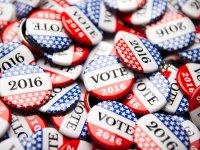Politics: The Great Pumpkin
Discussing politics is often considered a social risk, but it’s possible in the classroom by separating out the candidates, issues, process, and outcome.
Your content has been saved!
Go to My Saved Content.As a history teacher, I always took it as a badge of honor when, at the end of a presidential election cycle, my students were unable to figure out who I had voted for. I felt that I had done my job, masking any bias that I might have toward a particular candidate or issue, and instead focusing on creating a learning environment where multiple perspectives could be heard and evaluated.
Of course, U.S. history is filled with examples of mudslinging elections, so this current cycle is all in the vein of the electioneering that accompanies a time-honored process which holds allegiance to democracy. The vitriol can be hard to stomach at times, especially with the explosion of social media and the relentless nature of information sharing.
It can be challenging for students to engage in positive, productive, and healthy dialogue when it comes to the election and primary contests. Invariably, feelings get hurt, differences of opinion feel personal, and the perils of being a teenager with an opinion outside of the "crowd" weighs on the minds of teens.
How can we create an environment in schools where all voices can be heard and valued during a presidential election cycle?
Noise vs. Issues
Parents and teachers need to encourage students to try separating out the candidates, the issues, the process, and the outcome. This isn't easy, but trying to do it is critically important. The candidates inevitably consume the news cycle, and in the current campaign, the level of mudslinging magnifies the impact and dissemination of information about the candidates. Often, a candidate's persona will become so consumed and processed by the media that it becomes difficult to really know and understand him or her as a person, separate from being a political figure. This is the perfect opportunity to teach media literacy.
The issues can too easily get lost. What is a candidate's opinion on gun control, the economy, education, health care, etc.? How can we break down these opinions, examine and contest facts and figures, and sort the various solutions being proposed? Parents and teachers should encourage students to look deeper at the various candidates.
The process of electing a president is fascinating and worthy of careful analysis and understanding. The Founders of the United States devised the electoral college system to elect the head of the Executive Branch. This is a winner-take-all system, whereby the candidate who wins the popular vote within a state garners all of the electoral college votes, even if one candidate wins a razor-thin popular vote victory over his or her rival. Is this fair? Does it lead to the best electoral outcome for the country? This is a debatable question and speaks to the process of electing a president.
The state-by-state primary election process that we are currently going through reveals the different methods that the states use to declare a primary winner, with some states (like Washington) using a caucus system. What is the advantage of a caucus versus a more traditional vote? What does this reveal about democracy? These are interesting questions.
Understanding the Process
Most importantly, children need to be reminded about one of the most remarkable aspects of democracy in the United States: at the end of the process, there is an acceptance of the outcome. We saw that most recently in the election of 2000, where the final votes were contested and there was some question about whether Al Gore would bring a legal case to contest the outcome over the vote tally in the state of Florida. As you will recall, had Gore won the popular vote in Florida, he would have earned enough electoral college votes to win the election. Instead, he opted to help the country move forward with George W. Bush as the new president. Regardless of your politics, again, this is an interesting case study to examine and question with students.
Most recently, there has been widespread discussion of a potential brokering of the Republican convention, whereby the Republican party might not award Donald Trump with the nomination, even though he has won the largest number of delegates during the primary season. Again, no matter which side of the political fence you sit on, this is an interesting question to examine. Is it fair and just in a democracy?
I understand that a lot of emotion accompanies a presidential election cycle. I grew up in a family where we discussed and debated politics on a regular basis, and those conversations sometimes grew heated. It's not easy.
In the Peanuts comic strip, the character Linus said, "There are three things I have learned never to discuss with people. . . religion, politics, and the Great Pumpkin."
While there may be some question about how you discuss the Great Pumpkin in your classroom, I wouldn't want us to adopt the viewpoint of Linus and avoid the topic of politics. So in the comments section below, please share your thoughts on teaching civics and the history of American government in today's heated political climate.
